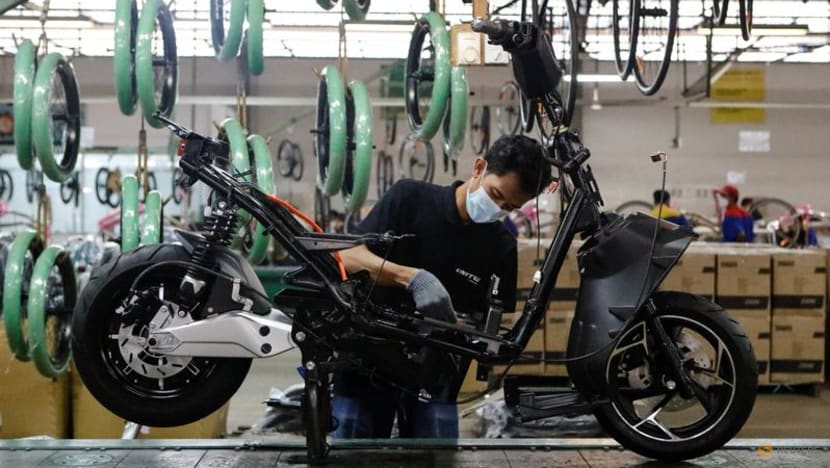Indonesia offers US$458 subsidy for electric motorcycles in bid to spur EV adoption

An employee works at the assembly line of an electric motorcycle at the United E-Motor factory in Bogor, near Jakarta in Indonesia on Aug 25, 2022. (File photo: Reuters/Ajeng Dinar Ulfiana)
JAKARTA: In a bid to increase the mass adoption of electric vehicles (EVs) in the country, the Indonesian government has introduced a subsidy for the purchase of electric motorcycles.
The 7 million rupiah (USS$458) subsidy for the purchase of electric motorcycles, however, is only available to selected groups of people.
These include those who are registered as beneficiaries of the people’s business credit programme, micro business productive assistance, those who are on wage subsidy assistance as well as those in households that are given electricity subsidies.
In a statement on Tuesday (Mar 21), Industry Minister Agus Gumiwang Kartasasmita said the subsidy aims to speed up the growth of the electric vehicles ecosystem in Indonesia.
"To accelerate the formation of the electric vehicle ecosystem, the government has issued a policy of providing assistance for the purchase of two-wheeled electric vehicles which comes into effect from Mar 20, 2023," Mr Agus said.
He added that the implementation of the subsidies will be supported by an independent verification agency.
According to the director general of Metal, Machinery, Transportation Equipment, and Electronics Industry of the Ministry of Industry Taufiek Bawazier, the electric motorcycles eligible for the subsidies will need to be registered.
These vehicles must then meet the Domestic Component Level (TKDN) value requirement of at least 40 per cent. The TKDN refers to the quantity of domestic components in a good or service.
Earlier on Monday, Finance Minister Sri Mulyani Indrawati said that 7 trillion rupiah in state funds will be set aside for the subsidies.
According to Reuters, Mdm Mulyani said that the subsidies will cover the sale of 800,000 new electric motorcycles as well as the conversion of 200,000 combustion engine motorcycles.
Earlier in December, Mr Agus said the Indonesian government aims to offer a subsidy of more than US$5,000 on every sale of an electric car in the country.
He said then that the incentives will be offered to buyers of electric vehicles produced by firms with factories in the country.
Indonesia aims to have at least 1.2 million electric bikes and 35,000 electric vehicles in use by 2024.
As of October last year, there were some 32,000 electric motorcycles on Indonesia’s roads, according to local media reports.
SUBSIDY GIVEN "SUBSTANTIAL", THOUGH UPTAKE DEPENDS ON OTHER FACTORS: ANALYST
An analyst whom CNA spoke to said that while the subsidy is "substantial", there are several issues that need to be addressed before consumers make the switch to electric motorcycles.
Mr Manggi Taruna Habir, a Visiting Fellow at ISEAS – Yusof Ishak Institute, said that the 7 million rupiah subsidy is an attractive discount for consumers, given that the cost of an electric motorcycle ranges between 17 million and 25 million rupiah.
Beyond that, he added that the low energy cost of using an electric motorcycle is an advantage for users.
“One positive feature of the electric motorcycle is its energy cost, with the electric motorcycle’s energy cost being much lower than that of fossil fuel cost. So, it is more fuel cost-efficient,” said Mr Manggi, who currently does research on the EV industry in Indonesia.
However, he pointed out that some issues - including poor resale value, limited availability of after-sales service and charging stations, as well as battery safety standards - need to be resolved first to ease users into switching over to electric motorcycles.
“Given that the secondary used market is not yet established, (the resale value of) used electric motorcycles is much lower than the conventional one,” Mr Manggi told CNA.
“Another (issue) is the limited after-sales service for electric motorcycles when they need servicing or fixing or changing of parts.”
Mr Manggi stressed that a more developed infrastructure is needed in order to encourage consumers to switch from a conventional fuel-based motorcycle to an electric alternative.
“(This) would require a more developed after-sales service infrastructure and electric fill-up station network across the country as well as a vibrant second-hand market to ensure (that) the value of the motorcycle bought retains as much of its value as possible,” he said.
“The proposed subsidy is a start, but there is still much work to do. Still, there is considerable interest and potential in the future of electric vehicles as we all look for cleaner energy alternatives.”
















